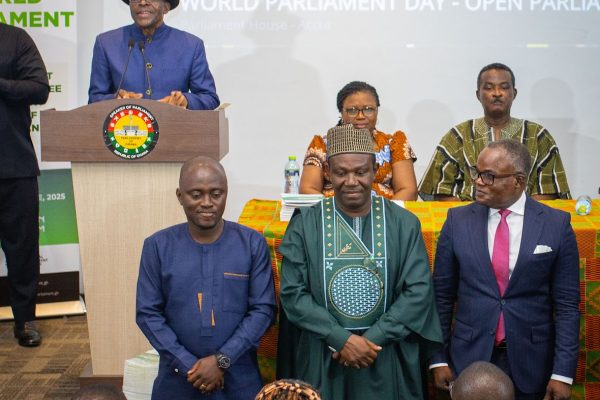In the last opinion piece I wrote under my Hansards of a Street Parliamentarian series, I gave five reasons why the majority group in Parliament got it all wrong with the budget process and also argued that in this 8th Legislature, “debates and victories during votes in Parliament will sometimes rely heavily on strategy rather than on the superiority of a side’s argument.” This is exactly what played out in Parliament yesterday as only Members of the Majority Caucus constituted a Sitting of the House to approve the Motion on the Budget Statement and Economic Policy of the Government of Ghana for the year 2022.
In this blog, I tell you why I think the Majority side of the House dribbled their colleagues in the Minority to win a round one fight, and how this sets them up for three more ‘bloody’ rounds between now and the end of year 2021. I seek to offer opinion on whether there were sufficient numbers in the House to take the decision that was taken yesterday; whether the entire budget has been approved for people to have reasons to celebrate; and what the happenings of yesterday may portend for Majority-Minority relations and the relationship between the Rt. Hon. Speaker and his Deputy Speaker.
The Argument on Numbers:
In my last article, I opined that the Majority Group got their interpretation of Article 104 and Order 109 wrong as I made the case that one determines how many MPs are present on a Sitting Day by the number that is entered in the attendance register of the House. I hold this same opinion, as I think the Minority Caucus is also wrong in arguing that 1st Deputy Speaker Joe Osei-Owusu cannot be counted as part of MPs present yesterday. In fact, the Votes and Proceedings (minutes) of yesterday, when published today, will show the names of 138 MP under the section for Members Present and show the remaining names under absent/absent with permission sections. This has always been the case whenever a Deputy Speaker chairs proceedings of the House from the beginning on a Sitting day. The practice of the House has been consistent in mentioning at the beginning that the Deputy Speaker chaired, but also lists that same person as part of MPs present.
This means that with 138 MPs listed on the attendance register, the House satisfied one of the conditions of Article 104(1) which stipulates that “at least half of all members of Parliament” must be PRESENT to make decisions in the House. The 1st Deputy Speaker then declared his inability to vote but argued that it also satisfies the other part of Article 104(1) which requires that “matters in Parliament shall be determined by the votes of the majority of members present and voting…” where now Members present were 138 but those voting came to 137. I considered this stance as a technically correct one, but with very major consequences for the precedent that it has brought about, which will affect our parliamentary practice significantly as a country.
The Case of a Four-Stage Budget Approval Process:
For ease of understanding by my readers and for purposes of public education, I say that to complete the budget approval processes in Parliament, there are four stages involved.
The first stage is to have the Minister of Finance, acting on behalf of the President, present the ECONOMIC POLICIES of the Government to Parliament and move a motion for the approval of that Statement and Economic Policies for the ensuing year. This is debated by both sides of the House over a number of days and the question to accept or reject the motion is put for the decision to be made. So, what has been happening since the Finance Minister came to Parliament a few weeks ago, are all in fulfilment of this first stage. From here the budget estimates for each Ministry/Department/Agency (MDA) will be referred to Committees of the House with oversight responsibility on that MDA for consideration and report to the plenary. Each of these estimates must be approved by the whole House after the Committee responsible has presented a report. For example, the estimates for the Ministry of Health will show what amount is to be allocated to that Ministry, how much of it will be used for salaries, CAPEX etc; and this will be referred to the Health Committee of Parliament for consideration and report, in fulfilment of what I term Stage Two of the process.
What I consider as Stage Three is where all matters in the Budget Statement and Economic Policy of the Government that requires legislation, will come to the House in the form of Bills to be passed. This is where for example, the controversial e-levy intention will be brought in the form of a Bill to be passed in Parliament and these will go through the full length of the lawmaking process including consideration by Committees and reporting to the plenary, clause-by-clause discussion at plenary, as well as First, Second and Third Readings.
The Fourth and Final Stage, after which one can say that the Government Budget for 2022 has been fully approved, is the passage of an Appropriation Bill. This when assented to by the President as the Appropriation Act, becomes the instrument that gives power to the Government to withdraw and use monies from the Consolidated Funds of the State. The Appropriation Bill, just like any other Bill in Parliament, goes through all the stages of the lawmaking process.
I guess one can now appreciate why I say the period between now and the end of this year will be very rough in Parliament considering that the Minority will have to play very significant roles in the remaining three stages of the Budget process, and yet they have declared that the battle lines as drawn, giving indications of the posturing and possible actions they will take which will invariably frustrate the work of the Government – a situation all of us as Ghanaians and other stakeholders will wish were avoided. With yesterday’s Press Conference addressed by the Minority Leader serving notice to call for the numbers in the House to be counted and a ‘proper vote’ taken on every matter so far as this budget is concerned, one can imagine that all Ministers who are MPs and all MPs who may have other important national assignments outside of Parliament (including our representatives to the ECOWAS Parliament which is sitting in Abuja from now to Mid-December) will be grounded because everything will now come to the numbers game. A very avoidable battle line indeed!
Swords Drawn:
Unfortunately, our Parliament will now walk the thin line of that adage “he who draws his sword against his prince must throw away the scabbard.” Consensus-building appears to have been thrown to the dogs and I foretell that the coming days before Christmas will see many more incidences.
Another thing that is worrying, is how the 1st Deputy Speaker superintended a Sitting that basically made nonsense the directives and rulings of the Substantive Speaker and how this may gravely affect the relationships at the Speakership. A careful assessment of the language used by the Hon. Majority Leader in moving a motion to set aside the decision of last Friday will show that the interest was not to rescind the earlier decision of the House but to have that decision declared as improper, null, and void. The records of the House capture Mr. Kyei-Mensah-Bonsu as moving the motion that the 1st Deputy Speaker in the Chair “properly” propose for determination the original motion of the Finance Minister and “set aside the impropriety” as he concluded that “what happened that day is a nullity.” One of the attributes that has proven very useful for Ghana’s Parliament in the past, is when the Speaker and his Deputies enjoy cordial relationships characterized by trust for each other.
My mother always told me, if you cut off your tongue and ate it, you have had no meat. I truly wish our legislators will come to the realization of the novel dynamics of this current Parliament, and be kind enough to Ghanaians to respect our collective quest that both sides work together to make our Nation better.
The Writer of this Opinion Piece is Executive Director for Parliamentary Network Africa – a civil society parliamentary monitoring organization – and will welcome your feedback via this email address: sobeng@parliamentafrica.com
By: Sammy Obeng





